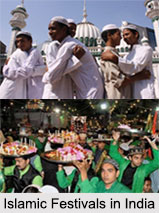 Islam is a monotheistic religion commanding a huge group of followers in India. In fact, Islam is the second largest religion in the world. The word `Islam` implies total surrender to the Almighty. Hence, the follower of Islam, a Muslim, is the one who yields or surrenders himself or herself to God in peace. Whenever, a Muslim accepts Islam with a free-heart, mind and soul, it means that he is committing himself to belief without reservation, accepting the tenets of faith and following both the letter and the spirit of the Holy Quran, believed to be the direct and immediate word of God.
Islam is a monotheistic religion commanding a huge group of followers in India. In fact, Islam is the second largest religion in the world. The word `Islam` implies total surrender to the Almighty. Hence, the follower of Islam, a Muslim, is the one who yields or surrenders himself or herself to God in peace. Whenever, a Muslim accepts Islam with a free-heart, mind and soul, it means that he is committing himself to belief without reservation, accepting the tenets of faith and following both the letter and the spirit of the Holy Quran, believed to be the direct and immediate word of God.
Origin of Islam
The origins of Islam lie in the revelation which the Prophet Muhammad, a descendant of a noble Arab tribe, received in the 7th century in Mecca through the intermediary of the Archangel Gabriel. The revelation came upon Muhammad when he was in middle life, and he made it known progressively to his companions over a number of years. These utterances of the revelation were subsequently committed to writing, and constitute the Quran, which is the sacred book of Islam. Following its revelation to Muhammad, Islam rapidly spread and become the religion of virtually all Arabs.
The Holy Quran
The holy Quran is the sacred book of Islam. The language of the Quran is Arabic, which is the sacred language of Islam. The words of the Quran have been faithfully preserved in the form in which they were originally received and their recitation constitutes a liturgical act. Being the "uncreated Word of God", the Quran is at the centre of the Islamic religion. The Holy Quran states that God has given man an alternative between good and evil and to seek God"s pleasure through faith, prayer and charity.
 Islamic Belief
Islamic Belief
The central Message of Islam is the declaration of faith (Shahada) -
"La ilaha ilallah, Muhammadur Rasulullah"
Meaning - There is no god but God; Muhammad is the Messenger of God.
Allah is the name Muslims employ for the supreme and unique God, who created and thus rules everything. Muslims have faith in only Allah who is described as One, Omniscient and Omnipotent. He is neither begotten nor does He beget. Muslims believe that only God truly exists. Man and the entire cosmos exist only because God wills them to exist. God alone is the sole creator of everything that exists and manifests His glory, power and attributes. Believers are generally expected to observe the Five Pillars of Islam, which imply five duties that bond Muslims into a community.
Love of the Prophet is much cultivated in Islam, and classically takes the form of conformity to his Sunna. The Sunna includes not only the customs and usages, but also the Sayings of the Prophet. It is a cardinal source of Muslim teaching. The Sunna constitutes a norm for the whole of Islamic civilization.
Five Pillars of Islam
The Islamic Law or Sharia is characterized by the Five Pillars of Islam (Arkan-al-Islam). These are faith, prayer, fasting, almsgiving and pilgrimage.
1. Faith (Iman) is assent to the Shahada.
2. Prayer (Salah) is the canonical prayer that is observed 5 times daily.
3. Fasting (Sawm) is the abstention from food and drink from dawn to sunset
observed during the month of Ramadan.
4. Almsgiving (Zakat) is the giving of a portion of one"s goods for charitable purposes.
5. Pilgrimage (Hajj) is the pilgrimage to the Kaba at Mecca which a Muslim should make, if possible, at least once in his lifetime.
Apart from the five pillars, an important part of the practice of Islam is the prohibition of wine and pork. Wine symbolizes confusion and error whereas pork is a symbol of uncleanliness and sin. Gambling and usury are also forbidden by Islamic law.
 Worship in Islam
Worship in Islam
Muslims worship in the mosque and outside every mosque. A ritual of washing required prior to a prayer offering. The principal hall of a mosque is a plain enormous room, largely free from furniture. Islamic prayers are referred to as "Namaz". In Islamic tradition, Namaz should be read 5 times each day. According to Muslim faith, prayer helps stop the mind from wandering into the materialistic world and also to remember the divine rules of conduct. Islamic fasts are also integrally linked to religious rites and rituals. According to Islam, observing fasts during Ramazan helps in purifying the mind and removing one`s sins. A Muslim who observes fast for the whole month of Ramadan not only gains his physical fitness, but also much more spiritually.
Sects of Islam
The only important `division` within Islam is the one between Sunni Sect and the Shia Sect. Orthodox or Sunni Islam recognizes that the immediate successors (Khalifas) to the Prophet Muhammad, as head of the Islamic community, are the four Caliphs, Abu Bakr, Umar, Uthman and Ali. The establishment and subsequent development of lslam as a world religion rests on the pattern set by these four holy patriarchs. Shiaism, on the contrary, rejects the first three Caliphs and regards the fourth Caliph Ali as the only legitimate immediate successor to the Prophet, the chief reason being that Ali was of the `family of the Prophet`, since he was the latter`s son-in-law. Shiaism retains virtually all the orthodox doctrines and practices of Islam apart from the major matter of rejecting the first three Caliphs.
Sufism is a "mystical-ascetic" form of Islam. By concentrating solely upon the more devout aspects of religion, Sufis endeavour to attain direct experience of God by making use of "intuitive and emotional faculties". And this unusual direct experience is only obtained after one has trained to make use of the faculty. Sufism and Islamic law are generally considered to be complementary.




















